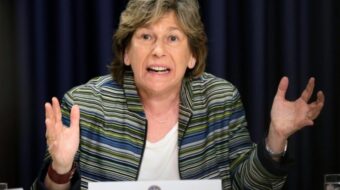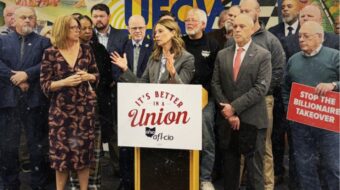BERKELEY, Calif. — Hundreds of striking service workers, other campus workers, students and faculty gathered on the steps of International House on the University of California–Berkeley campus April 14 to greet incoming UC Chancellor Robert Birgeneau with shouts of “Living wage now” and signs reading, “Strike for justice at UC.” Birgeneau, who was attending a faculty reception on the eve of his inauguration, has said he supports a living wage for the service workers. The service workers, whose wages have not been raised in two years, held their one-day walkout at a dozen UC facilities statewide.
AFSCME Local 3299, which represents some 7,300 UC janitors, food service workers, landscapers and bus drivers, said despite the university’s claims that the strike was illegal, almost all its members participated.
The service workers’ contract expired in June 2004, and was extended by mutual agreement to Jan. 31, 2005. Last month workers voted by 92 percent to authorize a strike.
Though union and university are far apart on wages, AFSCME spokesperson Faith Raider said the most urgent consideration is that a wage hike should be guaranteed and not be conditional on funding from the state.
“Most other workers — faculty, lecturers, librarians, graduate student instructors — got raises during the last two years, but the service workers did not,” said Raider.
“UC service workers’ wages are too low to cover the bare-bones costs of raising a family,” said a February 2005 report by the Oakland-based National Economic Development and Law Center (NEDLC). It noted that most workers were immigrants and people of color whose wage rates are “substantially lower” than those of other workers performing the same duties in the California State University system or the community colleges. Food service workers’ pay is so low they are income-eligible for nine major publicly funded welfare programs.
The union says other issues include a “chance to advance” with real opportunities and promotions, and “better rules to reduce discrimination and favoritism in hiring and promotions.”
Workers said favoritism is a major problem. “Performance evaluations should not be connected to wages,” said Peter Montoya, a longtime custodial worker at the Lawrence Berkeley Laboratory on the Berkeley campus. Montoya and co-worker Yosef Gedela also said workloads are extremely heavy, undermining quality.
The clerical workers’ Coalition of University Employees urged its members not to cross the picket lines, while the UC Students Association, the Graduate Assembly and other student organizations also backed the workers. Labor councils supported the strike. In San Francisco, buses were re-routed to avoid the UCSF campus and hospital, while in Los Angeles, garbage collectors did not pick up trash at UCLA.
In Santa Cruz hundreds of students and strikers sat in at the main entrance for several hours, and the campus was at a standstill. At UC Irvine, some professors brought their classes to the picket line.









